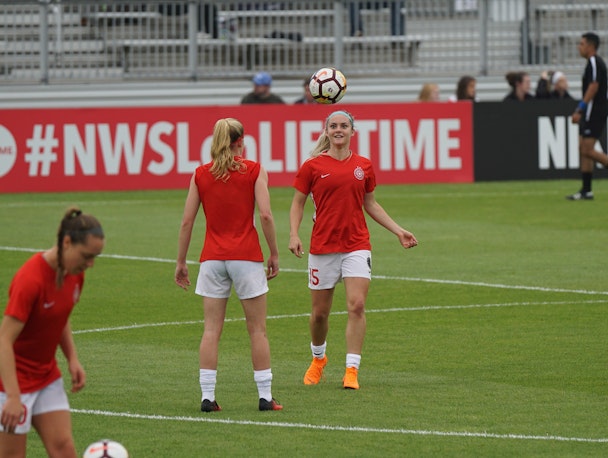In women’s sport, equality is coming home – but it still needs your help
The Fifa Women’s World Cup is in full swing in Australia and New Zealand. For England fans, it’s never too early to dream of bringing home the trophy – but Radley Yeldar’s Rebecca Ward has bigger hopes for the sport.

Equality in women's sport is getting closer - but we can't give up yet / Jeffrey F Lin via Unsplash
Have you started humming ‘It’s coming home’ yet? For England, the previous two World Cup tournaments have seen knock-outs at the semi-final stage. But now we have silverware in the cabinet. We’ve even won a trophy on penalties (in the ‘Finalissima’ game between England and Brazil, earlier this year). Is the 2023 World Cup the year football comes home?
I am, of course, talking about the Lionesses, England’s Women’s football team. But the sad reality is, you were likely more excited about the prospect owing to the lack of gender identification. You may have seen a recent advert from French telecom brand Orange which played on this fact, holding up a mirror to the too-loud football chants that the women’s game is not worth watching. The advert absolutely is worth watching.
As is women’s football. A lot of the UK public agrees; a staggering 17.4 million Brits tuned into the Women’s Euros Final when our Lionesses beat Germany at a sold-out Wembley, boasting an attendance of 87,192 – a record both for a women's international fixture in Europe, and for any European Championship finals match, men’s or women’s.
It’s not just football breaking records. This summer saw a series of record attendances at three of the T20 matches that made up the Women’s Ashes. The series ended in a draw (with Australia retaining the ashes), but arguably the team achieved a more important win for women’s sport.
The work still to be done
This all makes for great momentum, but there’s a lot of work still to do. Former England player Karen Carney was recently commissioned by the government to produce the ‘Raising the Bar – Reframing the Opportunity in Women’s Football’ report. It provides a stark summary of the inequalities that proliferate in the sport. Athletes in the Women’s Super League (WSL) can expect to be paid around 100 times less than their peers in the Premier League (men’s football equivalent league). Those in the Women’s Championship cannot even expect professional status or a minimum wage; many work additional jobs, aren’t afforded basic labor rights (like collective bargaining), and health care is inadequate. As a result, injuries which could be rehabilitated result in retirement instead.
The report culminates in 10 recommendations which span corporate structures, the professional environment, fan experience, and grassroots. The latter is a subject close to the Lionesses’ hearts. Earlier this year, the team enjoyed yet another win as the UK government committed to a £600m package for gender equality in school sport in response to their open letter to prime minister Rishi Sunak. This is desperately needed. According to the Football Association, only 46% of schools offer equal extracurricular sports to both girls and boys. As a result, according to 2016’s Always Confidence & Puberty Survey, around 64% of girls quit sports by the age of 16-17. Getting more girls into football (and other sports) isn’t just about improving our hopes of adding a star to the England shirt. Sport provides benefits for physical and mental health, vital life skills such as teamwork and communication, and it builds confident individuals. But we are currently not providing the opportunity in equal measures to young girls.
Businesses should take inspiration from this focus on grassroots. Every brand and organization should consider what it is doing to empower girls to be ambitious in their careers. Outreach activities can move the equality dial by building a strong and diverse pipeline of talent. At Radley Yeldar, we combine the science of behavior change with a rigorous strategic approach to inclusion for our clients, ensuring action and changing perceptions.
Everyone must take responsibility in striving for equality in sport. Encourage the women and young girls in your life to take up, continue playing, watch, and celebrate the sports they enjoy. Ensure the sporting role models on show in their life – via TV, social media, or in real life – positively portray women’s sport. Let’s build a world where young girls aspire to perform in sold-out stadiums.
Content by The Drum Network member:

Radley Yeldar
Radley Yeldar is an award-winning, independent, London and Birmingham-based creative consultancy. Our 200-strong team of specialists has been helping to create a...
Find out more
